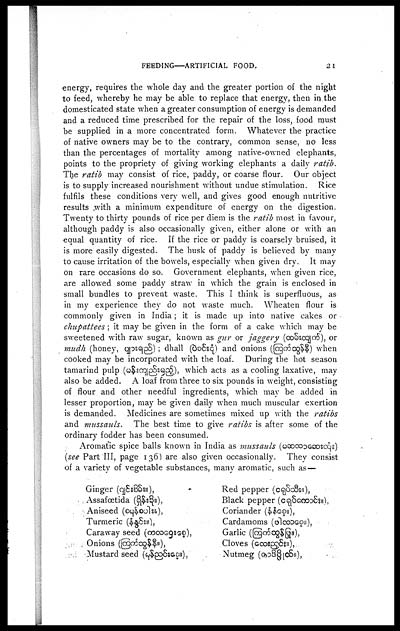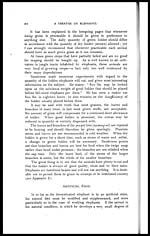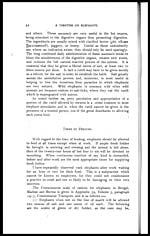Medicine - Veterinary > Veterinary diseases > Elephants and their diseases > Part I - Supply, general hygiene, gear, mounting and restraint
(49) Page 21
Download files
Individual page:
Thumbnail gallery: Grid view | List view

FEEDING—ARTIFICIAL FOOD. 21
energy, requires the whole day and the greater portion of the night
to feed, whereby he may be able to replace that energy, then in the
domesticated state when a greater consumption of energy is demanded
and a reduced time prescribed for the repair of the loss, food must
be supplied in a more concentrated form. Whatever the practice
of native owners may be to the contrary, common sense, no less
than the percentages of mortality among native-owned elephants,
points to the propriety of giving working elephants a daily ratib.
The ratib may consist of rice, paddy, or coarse flour. Our object
is to supply increased nourishment without undue stimulation. Rice
fulfils these conditions verv well, and gives good enough nutritive
results with a minimum expenditure of energy on the digestion.
Twenty to thirty pounds of rice per diem is the ratib most in favour,
although paddy is also occasionally given, either alone or with an
equal quantity of rice. If the rice or paddy is coarsely bruised, it
is more easily digested. The husk of paddy is believed by many
to cause irritation of the bowels, especially when given dry. It may
on rare occasions do so. Government elephants, when given rice,
are allowed some paddy straw in which the grain is enclosed in
small bundles to prevent waste. This I think is superfluous, as
in my experience they do not waste much. Wheaten flour is
commonly given in India ; it is made up into native cakes or
chupattees ; it may be given in the form of a cake which may be
sweetened with raw sugar, known as gur or jaggery ( ), or
mudh (honey, ) ; dhall ( ) and onions ( ) when
cooked may be incorporated with the loaf. During the hot season
tamarind pulp ( ), which acts as a cooling laxative, may
also be added. A loaf from three to six pounds in weight, consisting
of flour and other needful ingredients, which may be added in
lesser proportion, may be given daily when much muscular exertion
is demanded. Medicines are sometimes mixed up with the ratibs
and mussauls. The best time to give ratibs is after some of the
ordinary fodder has been consumed.
Aromatic spice balls known in India as mussauls ( )
(see Part III, page I 36) are also given occasionally. They consist
of a variety of vegetable substances, many aromatic, such as —
|
Ginger ( ), |
Red pepper ( ), |
|
Assafœtida ( ), |
Black pepper ( ), |
|
Aniseed ( ), |
Coriander ( ), |
|
Turmeric ( ), |
Cardamoms ( ), |
|
Caraway seed ( ), |
Garlic ( ), |
|
Onions ( ), |
Cloves ( ), |
|
Mustard seed ( ), |
Nutmeg ( ), |
Set display mode to: Large image | Zoom image | Transcription
Images and transcriptions on this page, including medium image downloads, may be used under the Creative Commons Attribution 4.0 International Licence unless otherwise stated. ![]()
| India Papers > Medicine - Veterinary > Veterinary diseases > Elephants and their diseases > Supply, general hygiene, gear, mounting and restraint > (49) Page 21 |
|---|
| Permanent URL | https://digital.nls.uk/75192167 |
|---|




